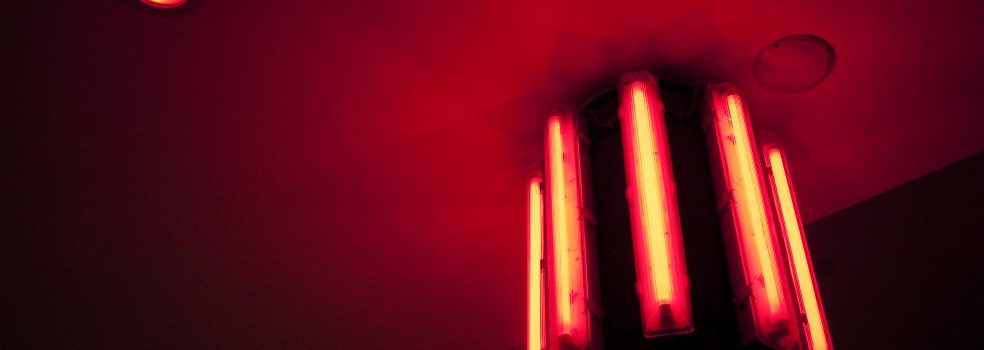At first sight of the building it was not possible to refrain from imagining its past. The beginning of a turbulent 20th century, the birth of a labor movement that was brought together and in need of a structure. Wanting to establish a place as a seat of power from which to weave its activities. The Vooruit was born from and by this movement, beside a bypass channel of the Scheldt in Ghent, in the heart of what was once a working class neighborhood. Initially called the Feestlokaal van Vooruit, the building above all functioned as a banquet hall for the working classes, even if it also housed a theater, a cinema, café and restaurant. Hundreds of couples sprang from meetings that were forged between its walls. They danced there to musette tunes now forgotten, they exchanged words of love and sealed unions by taking various forms of matrimonial vows.
Historical chronicles of the City of Ghent indicate that while the Vooruit had its heyday in the interwar period, it underwent a decline in the late forties. Curiously, these same chronicles have little to say about the slow rebirth of the place at the beginning of the 80s with the holding of more and more frequent concerts. The Vooruit thus established itself as an independent community center and benefited from renovations that were extended through many phases.
It is not appropriate to list here the many posters that adorned its doors in the decades that followed. Memorable concerts were held there. Of the top of the head, we remember The Cure in 1980, Siouxsie and The Banshees two years later; in I imagined a ball. A ball from the 1930s. Couples lost in the carelessness of their embrace. Pas de deux. Long dresses, gentlemen in their Sunday best.
the nineties Sonic Youth, the Cranes, Morphine, the beginnings of ‘I Love Techno’; in the 2000s, Killing Joke, Marc Ribot; more recently Russian Circles. But if there is a concert that remains in the annals it was undoubtedly that of Nirvana in autumn 1991. ‘Nevermind’ had been out for two months and was experiencing a meteoric rise in the charts. The concert was sold out and only a few journalists had the chance to interview the band that night. In a television interview, to the question of the RTBF journalist who asked why they smashed their guitars, Cobain laconically answered with two words freighted with symbolism: “Satisfaction. Climax.” While Novoselic more mischievously confessed that they didn’t want to have to do an encore.
My own epiphany at the Vooruit came earlier. In June 1988, I went there to see and hear the Swans. Incidentally, I had requested to interview the band. It had been scheduled to happen before the concert but for some reason it took place after. I remember my embarrassment at talking to a Michael Gira, visibly exhausted by his performance, who had no tangible desire to answer insipid questions from a whippersnapper. We were sitting in a badly lit loge, I had put my Sony tape recorder on a white formica table and was waiting for Gira to deign to answer me. At the time, he seemed preoccupied, disturbed even. By the interruption of one of his musicians, I understood that he was looking for Jarboe who had disappeared after leaving the stage. Gira asked me to follow him and continue our conversation while walking. We searched backstage hallways that I didn’t even know existed. The backstage and top floor of the Vooruit seemed to me immense. We arrived in the bathroom where Jarboe was standing near a sink, pale, drained, her makeup in disarray. There were words between them. I didn’t want to witness a scene, and I felt out of place. I slipped away.
I returned to the ballroom, which was now empty. Roadies pulled wheeled cases full of equipment and cables. I stood for a moment against a Nadar barrier that protected the PA system. I waited. I hoped Gira would join me to finish our conversation, but didn’t expect it would happen. My eyes fell on the ornaments of the stucco balconies. I imagined a ball. A ball from the 1930s. Couples lost in the carelessness of their embrace. Pas de deux. Long dresses, gentlemen in their Sunday best. Discreet lighting. This Vooruit no longer existed and would never return. It was now delivered to the torments of a show business that would not even speak its name.
There leaning against the Nadar, haggard, a plastic cup of warm beer in hand, I thought back to the words of this song from the Swans’ album Children of God, ‘Blind Love’: “I am a dead man. I am a cold dead man. I am unkind. Feel my hand. Feel my dead hand. Need my love. Need my blind love.” For a split second, I thought I felt a hand brush mine. A hand in slow motion. The hand of a dancer. A dancer dead long ago.
Eric Therer
